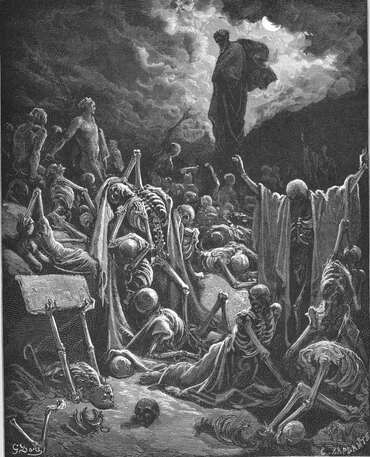1
ด้วยพระพิโรธ องค์พระผู้เป็นเจ้าทรงใช้เมฆบังธิดาของศิโยนหนอ พระองค์ได้ทรงเหวี่ยงสง่าราศีของอิสราเอลให้ตกลงจากฟ้าถึงดิน พระองค์มิได้ทรงระลึกถึงแท่นรองพระบาทของพระองค์เลยในยามที่พระองค์ทรงกริ้ว
2
องค์พระผู้เป็นเจ้าทรงกลืนที่อยู่ทั้งสิ้นของยาโคบเสียแล้ว และไม่ทรงเมตตา พระองค์ได้ทรงพังป้อมปราการทั้งหลายของธิดาแห่งยูดาห์ให้ลงด้วยพระพิโรธของพระองค์ พระองค์ได้ทรงทลายป้อมปราการเหล่านั้นลงถึงดิน และทรงกระทำให้ราชอาณาจักรและเจ้านายทั้งหลายในนั้นเป็นมลทินไป
3
พระองค์ได้ทรงตัดบรรดาเขาแห่งอิสราเอลให้ขาดสิ้นไปด้วยพระพิโรธอันรุนแรงของพระองค์ พระองค์ทรงดึงพระหัตถ์เบื้องขวาของพระองค์กลับมาเสียจากเขาต่อหน้าศัตรู และพระองค์ทรงเผาผลาญคนยาโคบดุจเพลิงลุกโพลงไหม้ไปรอบๆ
4
พระองค์ทรงโก่งธนูของพระองค์อย่างศัตรู ทรงยกพระหัตถ์เบื้องขวาทีท่าปัจจามิตร และได้ทรงประหารบรรดาคนที่ตาของเราจะอวดได้นั้นเสียในกระโจมของธิดาแห่งศิโยน พระองค์ได้ทรงระบายพระพิโรธของพระองค์ออกมาดุจเพลิง
5
องค์พระผู้เป็นเจ้าทรงเป็นเหมือนศัตรู พระองค์ได้ทรงกลืนพวกอิสราเอลเสีย พระองค์ได้ทรงกลืนบรรดาวังของเขาหมด และได้ทรงทำลายที่กำบังของเขาให้ ทรงทวีความเศร้าโศกและการคร่ำครวญในธิดาแห่งยูดาห์
6
พระองค์ได้ทรงพังพลับพลาของพระองค์เสียเหมือนหนึ่งเป็นเพิงในสวน ทรงทำลายสถานที่ประชุมทั้งหลายของพระองค์ พระเยโฮวาห์ได้ทรงกระทำทั้งเทศกาลตามกำหนดและวันสะบาโตให้ลืมเลือนไปในศิโยน ด้วยพระพิโรธอันเดือดดาลพระองค์ทรงดูถูกองค์กษัตริย์และปุโรหิต
7
องค์พระผู้เป็นเจ้าได้ทรงทิ้งแท่นบูชาของพระองค์เสีย พระองค์ทรงเกลียดสถานบริสุทธิ์ของพระองค์ กำแพงวังทั้งหลายนั้น พระองค์ได้ทรงมอบไว้ในเงื้อมมือศัตรู เขาทั้งหลายได้ส่งเสียงอึกทึกในพระนิเวศแห่งพระเยโฮวาห์เหมือนอย่างในวันเทศกาลตามกำหนด
8
พระเยโฮวาห์ได้ทรงตั้งพระทัยไว้แล้วว่าจะทำลายกำแพงของธิดาแห่งศิโยนเสีย พระองค์ได้ทรงขึงเส้นวัดไว้แล้ว พระองค์มิได้ทรงหดพระหัตถ์เลิกการทำลาย เหตุฉะนี้พระองค์ได้ทรงกระทำให้เนินดินและกำแพงนั้นคร่ำครวญ ให้ทรุดโทรมร่วงโรยไปด้วยกัน
9
ประตูเมืองศิโยนทั้งสิ้นทรุดลงในดินแล้ว พระองค์ได้ทรงทำลายและทรงหักดานประตูทั้งปวงเสียสิ้น กษัตริย์และเจ้านายทั้งหลายแห่งศิโยนก็ตกอยู่ท่ามกลางประชาชาติ ไม่มีพระราชบัญญัติอีกต่อไป บรรดาผู้พยากรณ์แห่งเมืองศิโยนหาได้รับนิมิตจากพระเยโฮวาห์อีกไม่
10
พวกผู้ใหญ่ของธิดาแห่งศิโยนก็กำลังนั่งเงียบอยู่บนพื้นแผ่นดิน เขาทั้งหลายเอาผงคลีดินซัดขึ้นบนศีรษะของตัว และนุ่งห่มผ้ากระสอบ สาวพรหมจารีทั้งหลายแห่งกรุงเยรูซาเล็มคอตกไปถึงดิน
11
นัยน์ตาของข้าพเจ้าก็ร่วงโรยเพราะร้องไห้ จิตวิญญาณของข้าพเจ้าก็ระทม เพราะความพินาศของธิดาแห่งชนชาติของข้าพเจ้า ตับของข้าพเจ้าเทออกบนพื้นดิน และเพราะเหล่าเด็กและเด็กที่ยังดูดนมนั้นเป็นลมสลบอยู่ตามถนนในกรุง
12
ลูกทั้งหลายถามแม่ของตัวว่า "แม่จ๋า ข้าวและน้ำองุ่นอยู่ที่ไหน" ขณะเมื่อเขาเป็นลมดุจคนที่ถูกบาดเจ็บตามถนนในกรุง เมื่อชีวิตของเขาต้องเทออกที่อกแม่ของเขาทั้งหลาย
13
โอ ธิดาแห่งเยรูซาเล็มเอ๋ย ข้าพเจ้าจะเอาอะไรมาเป็นพยานฝ่ายเจ้าได้ ข้าพเจ้าจะเปรียบเจ้ากับอะไร โอ ธิดาพรหมจารีแห่งศิโยนเอ๋ย ข้าพเจ้าจะหาอะไรที่มาเทียบกับเจ้าได้เล่า เพื่อข้าพเจ้าจะเล้าโลมเจ้าได้ เพราะความอับปางของเจ้าก็ใหญ่เทียมเท่าสมุทร ผู้ใดจะรักษาเจ้าได้เล่า
14
ผู้พยากรณ์ทั้งหลายของเจ้าได้เห็นสิ่งที่โง่เขลาและไร้สาระมาบอกเจ้า แทนที่เขาจะเผยความชั่วช้าของเจ้าออกมาให้ประจักษ์ เพื่อจะให้เจ้ากลับสู่สภาพดี เขาทั้งหลายกลับได้เห็นภาระที่เทียมเท็จอันเป็นเหตุให้เกิดการเนรเทศ
15
บรรดาคนที่ได้ผ่านไปมาก็ตบมือเยาะเย้ยเจ้า เขาทั้งหลายได้เย้ยหยันและได้สั่นศีรษะใส่ธิดาแห่งเยรูซาเล็มแล้วว่า "นี่หรือคือกรุงที่คนทั้งหลายได้ขนานนามว่า งามหมดจด ว่า เป็นความชื่นชมยินดีของคนทั่วทั้งโลก"
16
บรรดาศัตรูของเจ้าได้อ้าปากตะโกนโพนทะนาเจ้า เขาทั้งหลายเย้ยหยันและขบเขี้ยวเคี้ยวฟัน เขาพากันร้องว่า "พวกเราได้กลืนเมืองนี้แล้ว วันนี้แหละคือวันที่พวกเราได้จ้องมองหา พวกเราได้พบแล้ว พวกเราเห็นแล้ว"
17
พระเยโฮวาห์ได้ทรงกระทำตามพระประสงค์แล้ว ได้ทรงกระทำให้พระดำรัสของพระองค์สำเร็จ ตามที่พระองค์ได้บัญชาไว้นานแล้ว พระองค์ก็ได้ทรงทำลายอย่างไม่มีพระเมตตา พระองค์ทรงกระทำให้ศัตรูเปรมปรีดิ์เย้ยเจ้า พระองค์ได้ทรงชูเขาของพวกศัตรูของเจ้าขึ้น
18
จิตใจของเขาทั้งหลายร้องทูลองค์พระผู้เป็นเจ้า โอ กำแพงของธิดาแห่งศิโยนเอ๋ย จงให้น้ำตาไหลลงดุจสายน้ำทั้งกลางวันและกลางคืน อย่าให้เจ้าได้หยุดพัก อย่าให้แก้วตาของเจ้าหยุดหย่อนเลย
19
จงลุกขึ้นร้องไห้ในกลางคืน ในต้นยามจงระบายความในใจของเจ้าออกอย่างน้ำตรงพระพักตร์องค์พระผู้เป็นเจ้า จงชูมือทั้งสองของเจ้าขึ้นตรงไปยังพระองค์เพื่อขอชีวิตของบรรดาลูกเด็กเล็กแดงของเจ้า ที่หิวจนเป็นลมสลบไป ตามหัวถนนหนทางทุกแห่ง
20
ข้าแต่พระเยโฮวาห์ ขอทอดพระเนตรและพิจารณาเถิดว่า พระองค์ได้ทรงกระทำการเช่นนี้แก่ผู้ใด ควรที่พวกผู้หญิงจะกินลูกของตนหรือ จะกินทารกที่ยังอุ้มอยู่หรือ พวกปุโรหิตและพวกผู้พยากรณ์ควรจะถูกประหารในสถานบริสุทธิ์ขององค์พระผู้เป็นเจ้าหรือ
21
คนหนุ่มและคนแก่นอนเหยียดอยู่ตามพื้นดินในถนน สาวพรหมจารีและชายหนุ่มของข้าพระองค์ถูกคมดาบหวดล้มลงแล้ว พระองค์ได้ทรงประหารเขาในวันเมื่อพระองค์ทรงกริ้ว ได้ทรงสังหารเขาเสียโดยปราศจากพระกรุณา
22
พระองค์ได้ทรงเรียกผู้ที่ข้าพระองค์กลัวรอบทุกด้านมาอย่างในวันเทศกาล พอถึงวันที่พระเยโฮวาห์ทรงพระพิโรธก็ไม่มีสักคนหนึ่งหนีเอาตัวรอดได้ หรือคงเหลือตกค้างรอดตายอยู่ ผู้ที่ข้าพระองค์ได้อุ้มชูและเลี้ยงดูมานั้น ศัตรูของข้าพระองค์ได้เผาผลาญเสียหมดแล้ว







